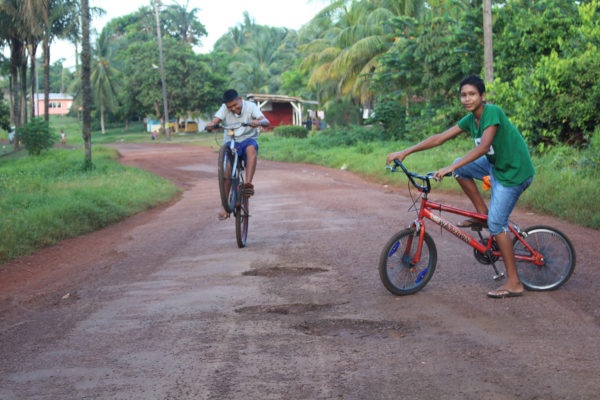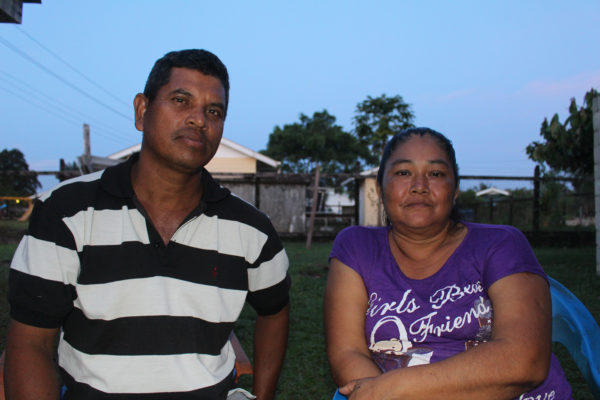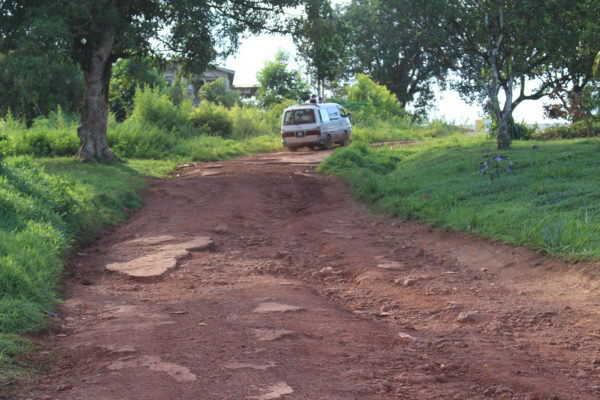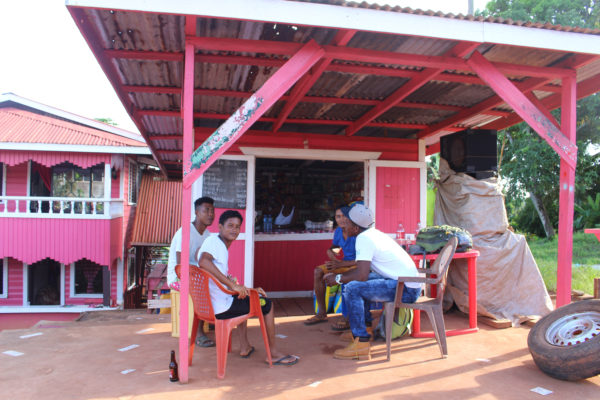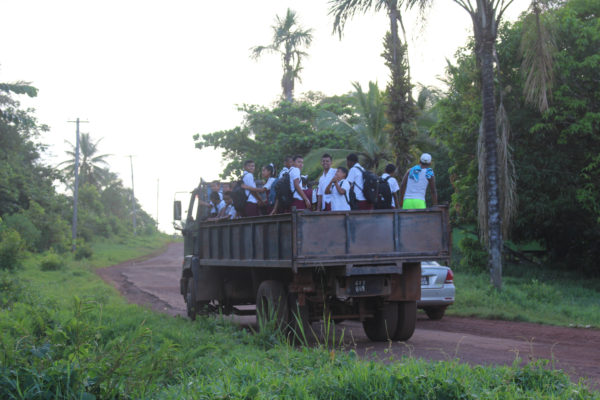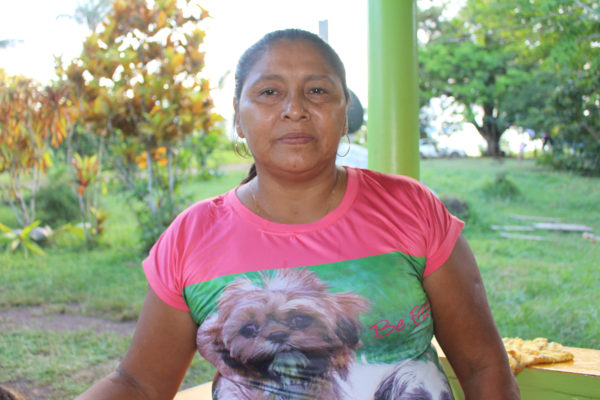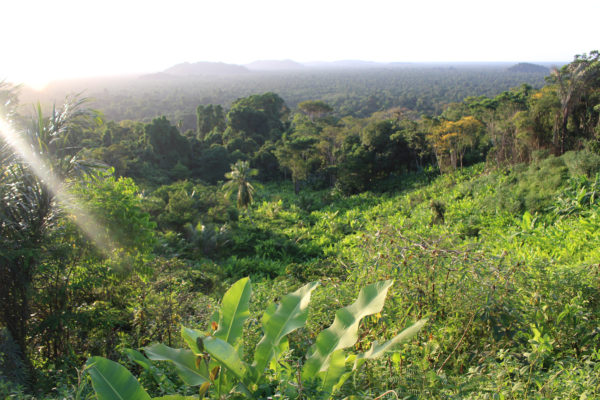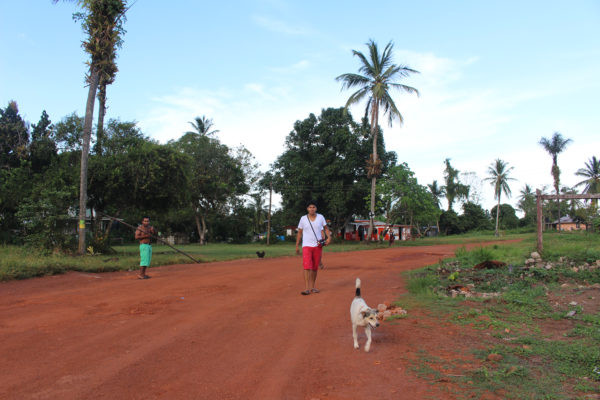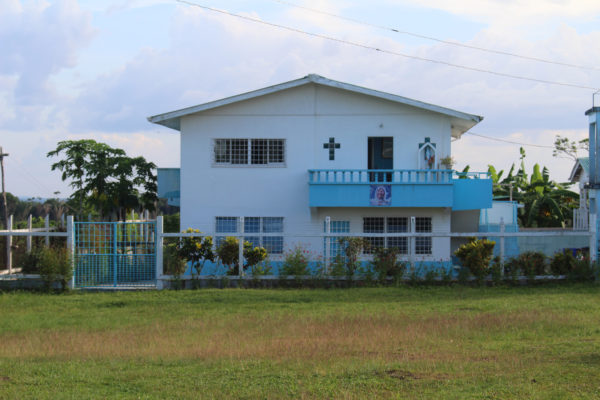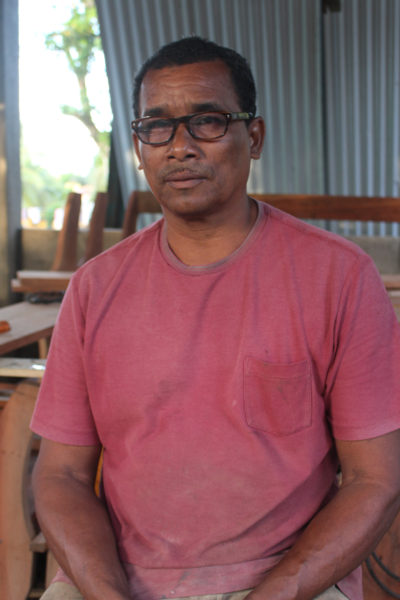Hosororo, a small community within the Mabaruma sub-district of Region One (Barima/Waini), exudes serenity. Its tranquility seems to be tied to the spectacular view of the valley below the hilly village.
When the World Beyond Georgetown visited, children were seen playing in a few of the yards. And in one of these yards lives vendor, Juliet Valenzuela, who was born and raised in Hosororo, had migrated to live in Georgetown for some 15 years, but returned home 11 years ago.
Valenzuela sells dhal puri, channa, soft drinks and local juice along with creole foods, which disappear as soon as the students of North West Secondary and workers nearby are let out for lunch.
Fruit trees abound in Hosororo. They can be seen in nearly every yard from the front right down to the back. No fruits were evident on any of the trees, but Valenzuela said that some of the villagers depend on the fruits, which they sell to earn a living.
“Today,” she said, “we have water and light wherein years ago we had only the rainwater or the water from the ponds to use.” However the village is only powered at night from five to eleven and has access to potable water every other day.
Apart from the disadvantage of having limited access to electricity and potable water, “the road is a major, major issue here along with the low employment rate,” Valenzuela said. And though she wishes to see developments in these areas she calls for street lights and telephones as well including a rehabilitation centre where persons with disabilities, like her son, can go to develop themselves.
Leaving Valenzuela, we passed two boys doing bicycle wheelies back and forth along the road. In one of the many unfenced yards a family enjoying the cool afternoon breeze and chatting, stopped to talk with us. The father, Arnold Moonsammy, who was at the back of the yard engaged in a conversation with his son was nominated as the family’s spokesperson.
But before we got to talking, a sand truck slowly climbed the hill but it wasn’t until it went past that we observe students of North West Secondary in the back. According to one of the Moonsammys, women and children who miss the buses that leave at 3.30 or sometimes 4 pm, resort to the lorry to get home.
Moonsammy, a self-employed joiner, mechanic and a grandfather, has been living in Hosororo for 22 years. He moved from Barima River.
“When we came here first we hadn’t so much houses,” Moonsammy said. “The struggle then was water, light, communication and transportation. Then we used to live downhill before we moved uphill. We had to fetch water from the pond or go to the creek which was 15 minutes away.
“We rear our own yard fowls and have a small kitchen garden so we hardly ever have to go to the market for greens and meat,” he said.
“We live in a peaceful area. Some other advantages are: we could produce almost anything we use in the kitchen; the land is so fertile. We have easier access to the hospital and the schools around. In Barima we moved by boat and it was very expensive,” he added.
However, on the downside Moonsammy said that many of their fruits spoil as they do not have sufficient markets for them. He said also that the unemployment rate is really high and although his son who attended a school in Georgetown did well at his Caribbean Secondary Education Certificate exams, he has had trouble getting a job since his return. “It got a lot of children with good grades but the problem is work,” he said.
Speaking of development he said, “The road comes as top priority for development. We need a better boat service, a regular boat service since everyone cannot afford the plane. The government boat comes once a month or every two months. The boats that come every week are private boats which cost a little more than the government boats.
“With Digicel we get good signal since they have three towers up here in the North West but with GTT the signal is in and out. They only have one tower up here”, Moonsammy said. He added that it would be nice if the Guyana Telephone and Company could have another tower installed but then said that it may be too expensive for the company.
Forty-seven-year-old Brenda Alberts was born and raised at Hosororo and lives with her husband and their five sons. She is a teacher at Hosororo Primary.
In her younger days, she said, “It wasn’t developed. It had a few houses. We hadn’t any business places – like only one I could remember and no sort of entertainment.
“Going to school was a struggle. The road was so bad especially when rain fall. We used to had to walk barefoot all the way to Mabaruma; no transportation. Walking in the mornings and back in the afternoons. We hadn’t much teachers to teach the subjects. The only subjects we did then was: English A, English B and Caribbean History,” she said.
“At that time there was no water supply. We had to go down in the valley to get water to bathe and the hardest part was fetching up back the water up hill; was like you didn’t even bathe. You perspire by the time you reach up back and you foot red-red. On Saturdays we used to go down with a tub full of clothes down in the valley and up back again wet and heavy. Now the children get it real easy. They don’t have to walk to school. They don’t have to wash at the creek and even if we get blackout it got generators. They have everything good now.”
Hosororo she said has a Catholic Church and an Assembly of God Church. There is also a convent where the nuns stay. Most of the people in the village are Catholics.
Hosororo has also a health centre, a nursery and primary school and a secondary department.
There is a huge water tank situated a few lots away from Alberts and when asked about it, she said it had been installed a month and a half before by Guyana Water Inc, but they were told it was for the benefit of Kumaka.
She said the cost of food is high and some groceries can be scarce at times.
At the hospital also, she added, certain services aren’t offered and patients have to be flown out to the city.
“I would like to see better road, better water supply and electricity, access to internet and job creation for the young people,” Alberts said.
But, “I like the quietness in Hosororo. The place is crime-free; you can leave your place open and gone and the neighbours will watch over. The people are friendly. One time we sleep away and left the shop open. I don’t know how we sleep away but around two in the morning somebody call ‘inside’ and when we look out and gone to see, the person said he just see the shop open and decide to call. He thought we wake up. But that’s how people live here. They don’t trouble anybody. They look out for each other.”
By that time Alberts’ husband, Leonard and their two oldest sons had arrived home and Leonard took pride in showing us around his land. They live on a hill and have only been able to plant a few coconut trees since the land is filled with huge rocks every few steps. But it’s not such a bad thing as they have a breathtaking view of the forest from their yard. It runs for miles below, as far as the eye can see, seemingly for once meeting the sky on the horizon.

